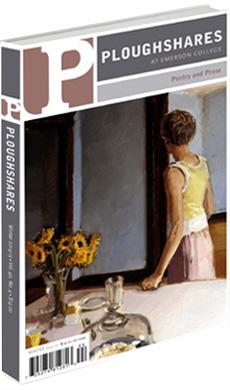I've been a subscriber to Ploughshares for a while now--two or three years I'ld guess. And this is the first time I've written about an issue, mostly because nothing that I've read has seemed important to write about. By far my favorite issue was the Spring 1984 poetry issue edited by Seamus Heaney sent as a free bonus for subscribing. I loved that one and keep it next to my document cam at school: in case we have a little extra time to talk about poetry, I open it to one of many dogeared pages and we read one. (Fun bonus: it featured a poet named Joyce James.)
This gets to one of my favorite things about Ploughshares: its use of guest editors who, presumably, keep the content from getting staid by bringing fresh perspectives. I admit I have not given a serious shake to every issue I've been sent yet (I'll get to them!) but it seems like the resulting variety appears only within a very narrow band. It's not like they're bringing in guest editors totally outside what they usually publish (literary work that is well crafted but only occasionally soulful).
Anyway, two stories in the latest issue really got me, and, happily, both are available free online. You should definitely read them.
“The Case for Psychic Distance” by Jennifer Hanno
Both stories involve public education and teachers and students, which actually makes me more exact as a reader rather than more forgiving. The story is also in second person which, as you know, is usually a mistake no matter how well written. Hanno sidesteps the problem through a metameta conceit which, again, should't work but does. Something about writing-about-writing-that-ends-up-being-the-writing-written-about-writing tends to the painfully cute, but Hanno's managed to turn cute into the adverb while making painfully into a noun. The hero of her tale intends to use writing as an escape, but fails and fails until she turns it burns into a rage that acts as catalyst for grief.
I'm being vague. That's because, dang it, I gave you the link and I want you to read the thing yourself. Seriously. Go read it. Go read it. Go read it.
“Rosalee Carrasco” by Tomiko M. Breland
I absolutely love the form Breland uncovered for this story. In brief, each character gets three sections---I is the character's past; II is the character during The Incident; III is the character after The Incident. (She does something simple and bold that makes me very very happy with one of her IIIs. You'll know which one instantly. You might even see it coming, but that won't change your delight.)
The Incident is a school shooting, though one very different from the sort that gives the 24hr news cycle two weeks of material. And the story is about how real people end up becoming what they become. How children become teenagers. How teenagers become adults. And as simple, flashlike, inandout character studies, the story is a great success. Largely because, like all great flashfiction, it's not simple at all. Read as a short-story-in-flashes, it's dense in lightness (if you will). But what's particularly remarkable about the story, however, is that, at the end it turns into an indictment on a certain aspect of modern American society. And not the indictment that had been casually hinted at throughout. In fact, indictment is the wrong word entirely. Found guilty does a better job.
Two things I like (and am unlikely to ever write about).
Here are two ongoing Ploughshares features I admire: Plan B is a writer writing about what else life offers (or could have offered); Look2 revisits and gives deserved attention to work not approved by the Church of What's Happening Now.
A note on the poetry.
The poetry is all over the place. Some I really like (eg, Beck's "Correcting My Mother's Essay") and others don't stick with me at all. But in honor of the recently completed #MormonPoetrySlam, here's a nice little number from Lance Larsen.
.png)

No comments:
Post a Comment